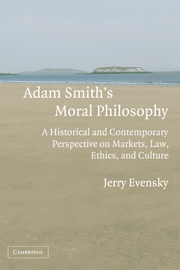 Adam Smith's Moral Philosophy
Adam Smith's Moral Philosophy Book contents
- Frontmatter
- Contents
- Preface
- Adam Smith's Moral Philosophy
- PART ONE ON ADAM SMITH'S MORAL PHILOSOPHICAL VISION
- PART TWO ON THE PLACE OF THE WEALTH OF NATIONS IN ADAM SMITH'S MORAL PHILOSOPHICAL VISION
- 5 On the Progress of Opulence, Setting the Scene in Book I of The Wealth of Nations
- 6 The Role of Capital in the Progress of Opulence: The Analysis of Book II of The Wealth of Nations
- 7 An Unnatural Path to Natural Progress: Smith Represents the Power of His Principles in Book III of The Wealth of Nations
- 8 Smith on the Mercantile System and the Evolution of His Voice: Book IV of The Wealth of Nations and Part VI of The Theory of Moral Sentiments
- 9 On the Role of Government: Book V of The Wealth of Nations
- PART THREE ON ADAM SMITH'S MORAL PHILOSOPHICAL VISION AND THE MODERN DISCOURSE
- Epilogue: On the Human Prospect
- References
- Index
9 - On the Role of Government: Book V of The Wealth of Nations
Published online by Cambridge University Press: 11 November 2009
- Frontmatter
- Contents
- Preface
- Adam Smith's Moral Philosophy
- PART ONE ON ADAM SMITH'S MORAL PHILOSOPHICAL VISION
- PART TWO ON THE PLACE OF THE WEALTH OF NATIONS IN ADAM SMITH'S MORAL PHILOSOPHICAL VISION
- 5 On the Progress of Opulence, Setting the Scene in Book I of The Wealth of Nations
- 6 The Role of Capital in the Progress of Opulence: The Analysis of Book II of The Wealth of Nations
- 7 An Unnatural Path to Natural Progress: Smith Represents the Power of His Principles in Book III of The Wealth of Nations
- 8 Smith on the Mercantile System and the Evolution of His Voice: Book IV of The Wealth of Nations and Part VI of The Theory of Moral Sentiments
- 9 On the Role of Government: Book V of The Wealth of Nations
- PART THREE ON ADAM SMITH'S MORAL PHILOSOPHICAL VISION AND THE MODERN DISCOURSE
- Epilogue: On the Human Prospect
- References
- Index
Summary
Having described in WN Book IV the errors of government policy that follow from competing systems of political economy, in WN Book V, the last Book of The Wealth of Nations, Smith goes into great detail as he describes:
what he believes government should and shouldn't do, and
how it should and shouldn't do what it should.
All these “shoulds” should suggest that WN Book V is a prescriptive, policy-oriented ending to Smith's Inquiry into the Nature and Causes of the Wealth of Nations. And it is.
Smith wrote in the Theory of Moral Sentiments, seventeen years before the publication of The Wealth of Nations, that:
if you would implant public virtue in the breast of him who seems heedless of the interest of his country, it will often be to no purpose to tell him, what superior advantages the subjects of a well-governed state enjoy; that they are better lodged, that they are better clothed, that they are better fed. These considerations will commonly make no great impression. You will be more likely to persuade, if you describe the great system of public police which procures these advantages, if you explain the connexions and dependencies of its several parts, their mutual subordination to one another, and their general subserviency to the happiness of the society; if you show how this system might be introduced into his own country, what it is that hinders it from taking place there at present, how those obstructions might be removed, and all the several wheels of the machine of government be made to move with more harmony and smoothness, without grating upon one another, or mutually retarding one another's motions. […]
- Type
- Chapter
- Information
- Adam Smith's Moral PhilosophyA Historical and Contemporary Perspective on Markets, Law, Ethics, and Culture, pp. 213 - 242Publisher: Cambridge University PressPrint publication year: 2005
